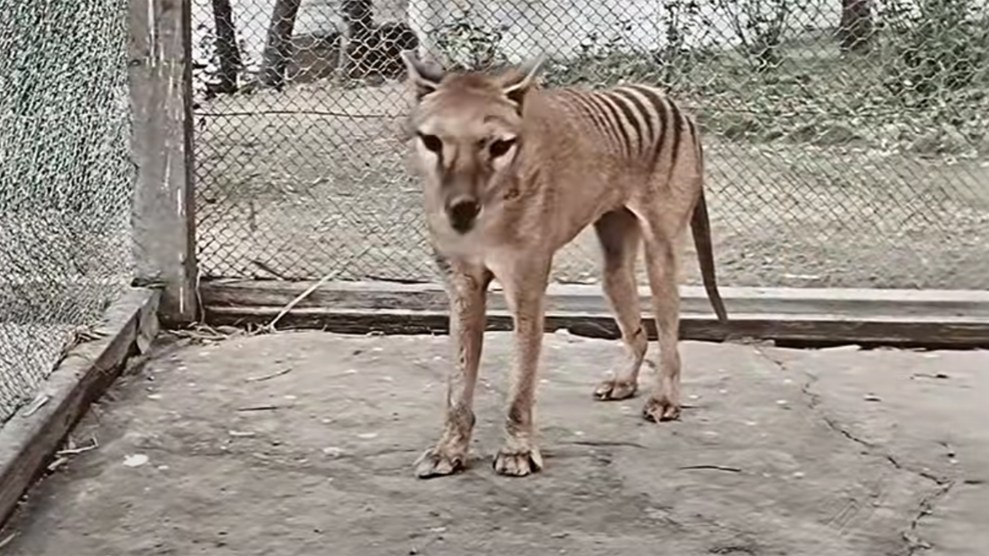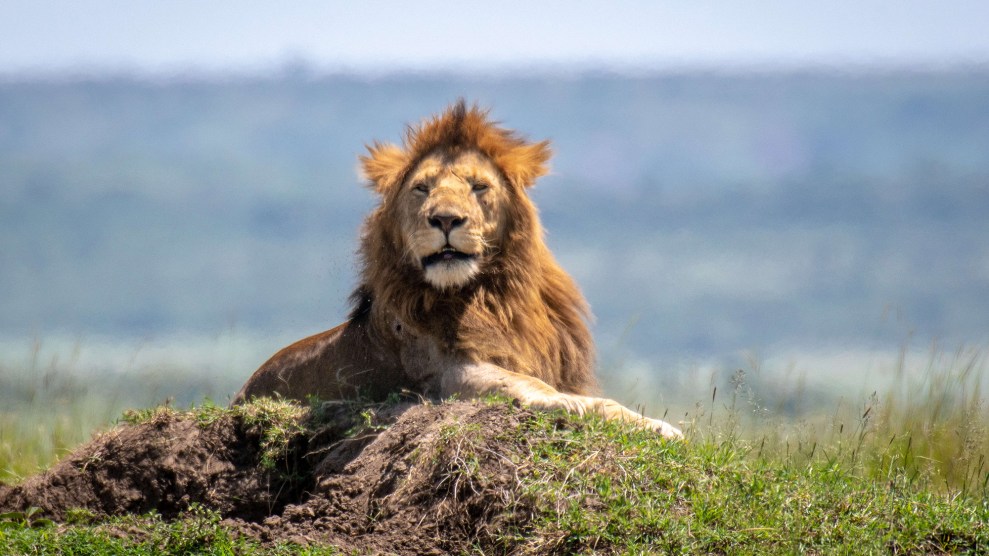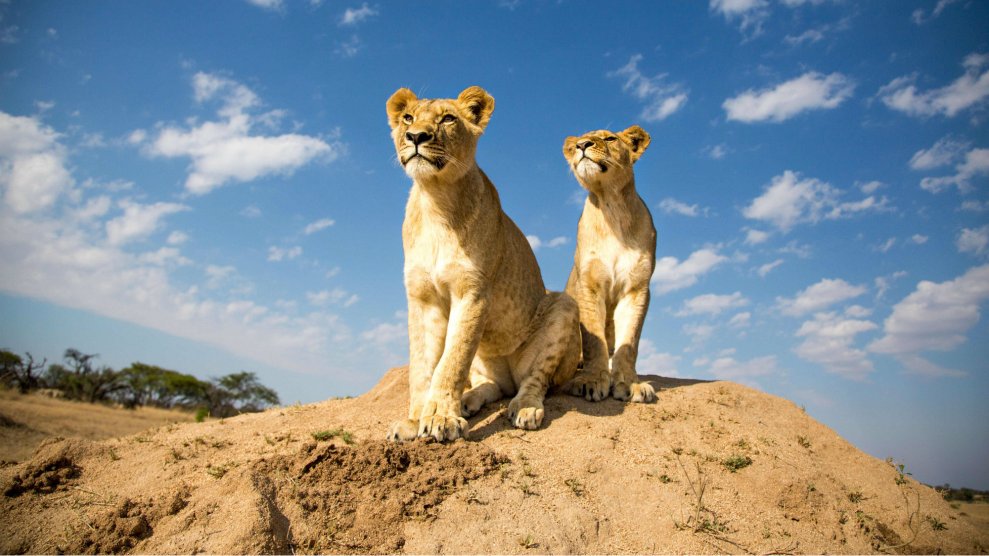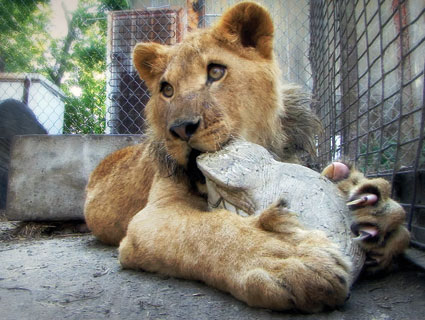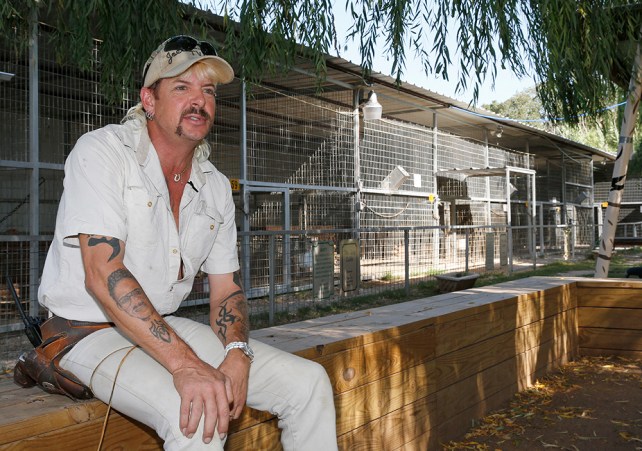
Tiger King star Joseph Maldonado-Passage, a.k.a. Joe Exotic, at his private Oklahoma big game zoo, which was later shut down by the authorities. He is now serving prison time for 17 counts of animal abuse and two counts of attempted murder for hire.
Sue Ogrocki/AP
This story was originally published by the Guardian and is reproduced here as part of the Climate Desk collaboration.
Conservation groups in the US have hailed a new law that will end what they call the “horrific” practice of keeping big cats such as tigers and lions as pets or as petting zoo amusements.
Joe Biden is expected to swiftly sign the new legislation, which requires that only certified zoos and universities are allowed to hold lions, tigers, leopards, jaguars and other large cats, following its passage in the US Senate this week. The House of Representatives voted for the bill, called the Big Cat Public Safety Act, in July.
The possession of tigers, in particular, is rife among private breeders and owners of roadside zoos in the US, with 30 states simply requiring that people fill out a form and obtain a $30 license to acquire the animals. Conservationists have long pushed to end this practice, claiming it leads to abusive treatment of big cats and poses a risk to the public.
Susan Millward, executive director of the Animal Welfare Institute, said the new law will help curb the “horrific exploitation” of big cats. “We must end the exploitative and dangerous trade in pet big cats, and ensure that no more cubs are ripped from their mothers at birth to be traumatized for profit,” she said.
There are fewer than 4,000 tigers left in the wild in the world but almost double that number are kept the US, according to estimates from animal welfare groups, with many held in small, dubious zoos with little oversight or as pets in people’s homes. The new law will allow existing big cats to stay with their owners but those on display will have to remain 15ft away from the public or behind a barrier to prevent contact.
The new legislation has been a decade in the making, according to Sara Amundson, president of the Humane Society Legislative Fund, and is the “death knell for the cub petting industry.”
“By closing the door on cub petting and the era of private citizens keeping big cats inappropriately, we’re making the country safer, better and kinder for all,” she added. “It couldn’t happen fast enough.”
The underworld of the captivity and display of tigers was highlighted in the 2020 Netflix documentary Tiger King, which introduced to the world the colorful antics of Joe Exotic, the eccentric owner of an exotic animal park in Oklahoma who has since been convicted on animal abuse charges, as well as over a plot to kill Carole Baskin, a rival big cat sanctuary owner. Baskin has backed the new legislation to restrict big cat ownership.
Several lawmakers who backed the new legislation cited public safety as a reason for doing so. America’s lax regulations around exotic animal ownership have proved deadly in the past—since 1990, 19 adults and five children have been killed, and hundreds of people people have lost limbs or suffered other severe injuries due to incidents involving big cats, according to the Humane Society.
In 2011, a man with a private zoo in Ohio released his menagerie of 38 big cats and a dozen other wild animals, including grizzly bears and wolves, before killing himself. Police hunted down and killed 48 of the animals, with several others presumed to have been eaten by other animals.
More recently, animal welfare advocates have highlighted the plight of India, Elsa and Loki, three tigers that were, in separate incidents in the past three years across Texas, found living in a cage in an abandoned home, shivering in freezing temperatures outdoors and, in India’s case, videoed wandering the streets of a Houston neighborhood.
“For too long, lax laws have allowed private citizens to own big cats,” said Mike Quigley, a Democratic lawmaker who introduced the bill to the House. “Big cats are wild creatures—they should not be subjected to a life of confinement, where they are used and abused for entertainment purposes.
“Additionally, the possibility of one of these cats escaping, will no longer loom over our communities and first responders. These cats will be safer, and so will we. I look forward to President Biden signing this bill into law.”
